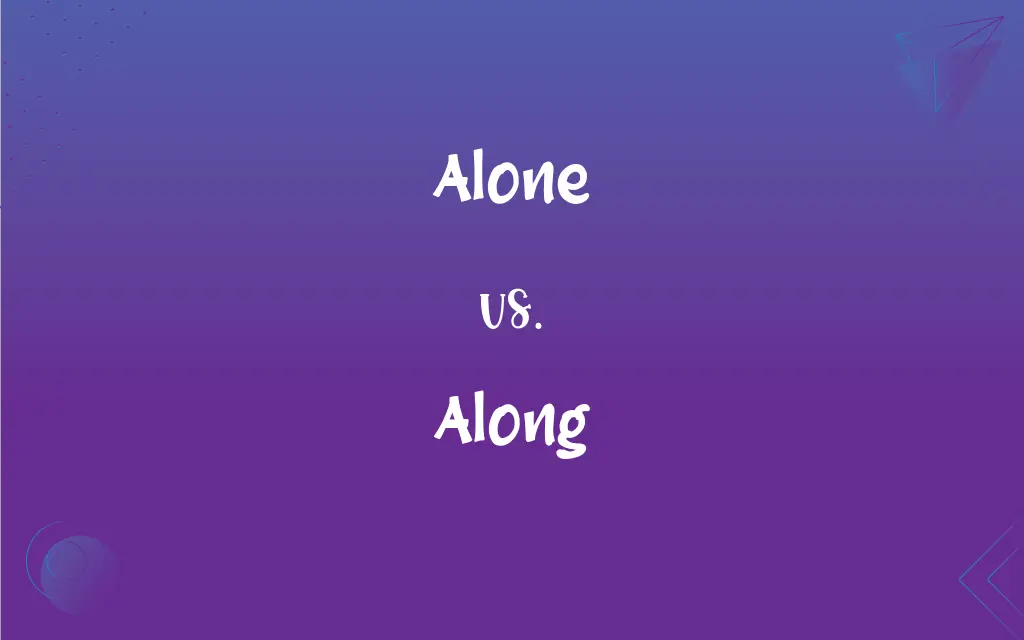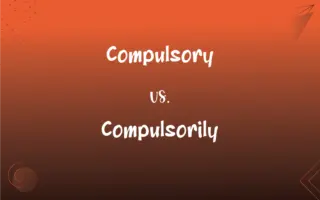Alone vs. Along: What's the Difference?
Edited by Aimie Carlson || By Janet White || Updated on October 3, 2023
"Alone" refers to being by oneself, without others. "Along" indicates movement or existence in a line, often in relation to other objects or people.

Key Differences
"Alone" and "Along" are two English words that serve different functions and meanings. "Alone" is often used as an adjective or adverb to describe a state of solitude or the absence of others. "Along," on the other hand, usually functions as a preposition or adverb that suggests movement or positioning in a continuous line or path.
The term "alone" could imply a lack of companionship, but it can also refer to a state of independence. "Along" is more directional, suggesting that something is moving or placed beside or parallel to something else. For instance, walking "along" the river implies that the river is a reference point for the movement.
From a grammatical standpoint, "alone" can be both an adjective and an adverb. For example, "She is alone" (adjective) and "She went alone" (adverb). "Along" mainly serves as a preposition or an adverb. For example, "He walked along the street" (preposition) and "Come along" (adverb).
In essence, "alone" pertains more to a state of being, while "along" pertains to directional or relational context. Understanding the nuances of these words is vital for their appropriate usage in sentences.
Comparison Chart
Meaning
Solitude or independence
Movement or positioning along a path
ADVERTISEMENT
Grammatical Role
Adjective and adverb
Preposition and adverb
Example Context
Emotional, situational
Directional, locational
Synonyms
Solo, isolated
Beside, alongside
Antonyms
Together, accompanied
Apart, away
Alone and Along Definitions
Alone
Unaccompanied
She went to the store alone.
ADVERTISEMENT
Along
Forward
The project is moving along.
Alone
Exclusive
The privilege is yours alone.
Along
Beside
She walked along the river.
Alone
Solitary
He sat alone at the bar.
Along
In agreement
He went along with the plan.
Alone
Singular
The alone reason for his action was greed.
Along
As a companion
Can I bring my friend along?
Alone
Being apart from others; solitary.
Along
Throughout
There are shops all along the street.
Alone
Being without anyone or anything else; only.
Along
Over the length of
Walked along the path.
Alone
Considered separately from all others of the same class.
Along
On a line or course parallel and close to; continuously beside
Rowed along the shore.
The trees along the avenue.
Alone
Being without equal; unique.
Along
In accordance with
The committee split along party lines over the issue.
Alone
Without others
Sang alone while the choir listened.
Along
Forward; onward
We drove along, admiring the view. Farther along, we passed a hitchhiker.
Alone
Without help
Carried the suitcases alone.
Along
As company
Bring your friend along.
Alone
Exclusively; only
The burden of proof rests on the prosecution alone.
Along
In accompaniment or association; together
Packed an atlas along with other books. See Usage Note at together.
Alone
By oneself, solitary.
I can't ask for help because I am alone.
Along
With one; at hand
Luckily, I had my camera along. Our guests should be along soon.
Alone
Lacking peers who share one's beliefs, experiences, practices, etc.
Senator Craddock wants to abolish the estate tax, and she's not alone.
I always organize my Halloween candy before eating it. Am I alone in this?
Along
(Informal) Advanced to some degree
My father is getting along in years.
Alone
(obsolete) Apart from, or exclusive of, others.
Along
By the length of; in a line with the length of; lengthwise next to.
Alone
(obsolete) Mere; consisting of nothing further.
Along
In a line with, with a progressive motion on; onward on; forward on.
Alone
(obsolete) Unique; rare; matchless.
Along
In company; together.
John played the piano and everyone sang along.
Alone
By oneself; apart from, or exclusive of, others; solo.
She walked home alone.
Along
Onward, forward, with progressive action.
Don't stop here. Just move along.
Alone
Without outside help.
The job was too hard for me to do alone.
Along
By the length; in a line with the length; lengthwise.
Some laid along . . . on spokes of wheels are hung.
Alone
Not permitting anything further; exclusively.
The president alone has the power to initiate a nuclear launch.
Along
In a line, or with a progressive motion; onward; forward.
We will go along by the king's highway.
He struck with his o'ertaking wings,And chased us south along.
Alone
Not requiring anything further; merely.
Oral antibiotics alone won't clear the infection.
Along
In company; together.
He to England shall along with you.
Alone
(hence) Used to emphasize the size or extent of something by selecting a subset.
Her wardrobe is huge. She has three racks for blazers alone.
The first sentence alone sold me on the book.
Along
By the length of, as distinguished from across.
The kine . . . went along the highway.
Alone
Quite by one's self; apart from, or exclusive of, others; single; solitary; - applied to a person or thing.
Alone on a wide, wide sea.
It is not good that the man should be alone.
Along
Now heard only in the prep. phrase along of.
Alone
Of or by itself; by themselves; without any thing more or any one else; without a sharer; only.
Man shall not live by bread alone.
The citizens alone should be at the expense.
Along
With a forward motion;
We drove along admiring the view
The horse trotted along at a steady pace
The circus traveled on to the next city
Move along
March on
Alone
Sole; only; exclusive.
God, by whose alone power and conversation we all live, and move, and have our being.
Along
In accompaniment or as a companion;
His little sister came along to the movies
I brought my camera along
Working along with his father
Alone
Hence; Unique; rare; matchless.
Along
To a more advanced state;
The work is moving along
Well along in their research
Hurrying their education along
Getting along in years
Alone
Solely; simply; exclusively.
Along
In addition (usually followed by `with');
We sent them food and some clothing went along in the package
Along with the package came a bill
Consider the advantages along with the disadvantages
Alone
Isolated from others;
Could be alone in a crowded room
Was alone with her thoughts
I want to be alone
Along
In line with a length or direction (often followed by `by' or `beside');
Pass the word along
Ran along beside me
Cottages along by the river
Alone
Lacking companions or companionship;
He was alone when we met him
She is alone much of the time
The lone skier on the mountain
A lonely fisherman stood on a tuft of gravel
A lonely soul
A solitary traveler
Alone
Exclusive of anyone or anything else;
She alone believed him
Cannot live by bread alone
I'll have this car and this car only
Alone
Radically distinctive and without equal;
He is alone in the field of microbiology
This theory is altogether alone in its penetration of the problem
Bach was unique in his handling of counterpoint
Craftsmen whose skill is unequaled
Unparalleled athletic ability
A breakdown of law unparalleled in our history
Alone
Without any others being included or involved;
Was entirely to blame
A school devoted entirely to the needs of problem children
He works for Mr. Smith exclusively
Did it solely for money
The burden of proof rests on the prosecution alone
A privilege granted only to him
Alone
Without anybody else;
The child stayed home alone
He flew solo
Alone
Isolated
The house stood alone on the hill.
FAQs
Can 'alone' mean unique?
Yes, "alone" can imply singularity, as in the "only one."
Can 'alone' be used as an adverb?
Yes, as in "She went alone."
Does 'along' require an object?
Generally, it is used with an object like "along the road."
Can 'along' be synonymous with 'together'?
In some contexts, like "Come along," it implies companionship.
Does 'along' always refer to movement?
No, it can also indicate location, as in "along the road."
What part of speech is 'along'?
It mainly serves as a preposition or adverb.
Is 'alone' a subjective term?
Yes, it can be subjective depending on individual feelings about solitude
Can 'alone' imply self-sufficiency?
Yes, it can indicate independence or self-reliance.
Can 'along' be used to imply agreement?
Yes, as in "to go along with the plan."
Is 'alone' a negative term?
Not necessarily; it can imply independence or freedom.
Can 'alone' imply loneliness?
Yes, it can denote a lack of companionship.
Does 'alone' have an antonym?
Yes, "together" or "accompanied" can be antonyms.
Is 'along' always about physical direction?
No, it can indicate metaphorical or abstract progression.
About Author
Written by
Janet WhiteJanet White has been an esteemed writer and blogger for Difference Wiki. Holding a Master's degree in Science and Medical Journalism from the prestigious Boston University, she has consistently demonstrated her expertise and passion for her field. When she's not immersed in her work, Janet relishes her time exercising, delving into a good book, and cherishing moments with friends and family.
Edited by
Aimie CarlsonAimie Carlson, holding a master's degree in English literature, is a fervent English language enthusiast. She lends her writing talents to Difference Wiki, a prominent website that specializes in comparisons, offering readers insightful analyses that both captivate and inform.































































